The women of Lohana Niwas in Girgaum's Papad Gali are an enterprising lot. From the freshest dhokla and khandvi to full-fledged tiffins, they are the early bird toilers who hawk garma garam jamvanu 365 days a year.
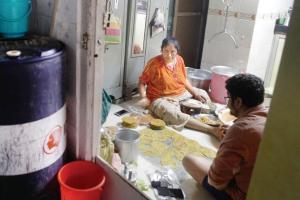
Jyotsana Kesariya has been using her one-room home in Shankar Bari Lane to prepare thepla and daily tiffins of Gujarati specialities like sev tameta nu shak, cabbage, dal, rice and pickle for 32 years. Pic/Ashish Raje
Lohana Niwas at the end of Girgaum's Shankar Bari Lane houses 300 homes. In the 1960s, almost every house in the eight buildings labelled A to H had a woman heading a small to medium-size food business. The enterprise ranged from rolling out as many as 5,000 rotis a day to theplas, dhoklas, khandvi and even full-meal tiffins for delivery.
But it was the papad that become famous after seven women from the group came together in 1959 and launched their business with a borrowed sum of R80. It provided employment to several women in the vicinity, most of them from the Gujarati Lohana community.
ADVERTISEMENT
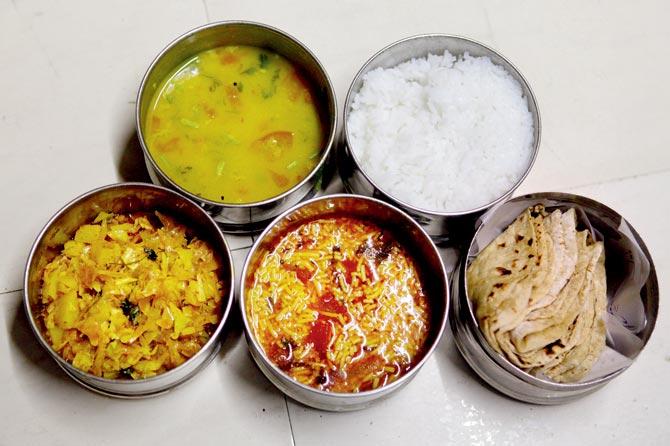
The urad flour was mixed with asafoetida (hing) and salt and the dough handed out in batches to the women, who took it home to roll out piles of papad. The organisation was Shri Mahila Griha Udyog Lijjat Papad. Today, the room where the story kicked off is a stocking centre, while the group has flourished to employ 45,000 women over 83 branches, across 16 Indian states.
We walk down Gaiwadi ahead of Chira Bazaar, asking for directions to Papad Galli. A flower seller tells us, "Aiya kyay aj che [it is somewhere here only], while a paanwala points towards Guzdar Street. We walk on, passing shops that print wedding cards.
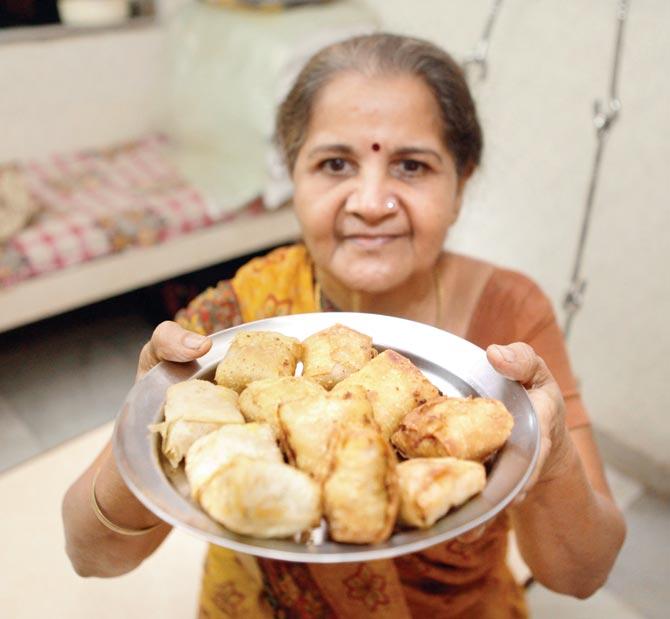
Ranjan Badiyani holds up a plate of her famous Chinese Jain samosa
Today, the number of homes that sell the snacks has dwindled to barely 20, but there continues to be a gentle, unseen buzz typical of home kitchens in chawls or what the Gujaratis call chali. The aroma of fresh theplas hangs in the air, as does the fragrant, fermented whiff of dhoklas accompanied by the sharp sting of rai tadka.
We climb three steps up into a corridor that resembles a ghost town. A clothes line dangles close to the ceiling. On either side, every door is open. We peep into dimly lit, match-box room that holds within it a kitchen, living room and bedroom.
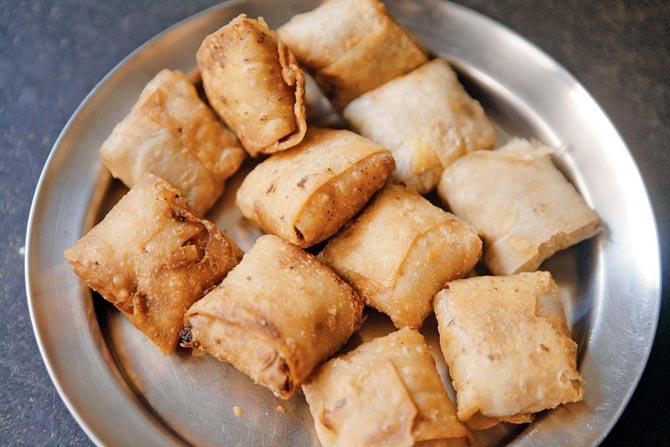
Jyotsana Kesariya, 50, is squatting on the floor in a red-and-yellow bandhini night gown. Around her are large utensils carrying Gujarati favourites sev tameta nu shaak, kobi bateta, a pot of rice, two stacks of rotis and theplas, dal and a jar of gajar-marcha no sambharo.
We knock, asking for permission to talk. She breaks into a smile. "Lunch time che, pehla maru khavanu chakho [It's lunch time; first taste my food]," she says. Above from the malyo (make-shift mezzanine accessed by a ladder) a wrinkled face stares at us. We smile, but he looks away. "He is my brother-in-law... Has been unwell for a while," she says, handing us a steel thali filled with items that she has shipped off in tiffins across the city.
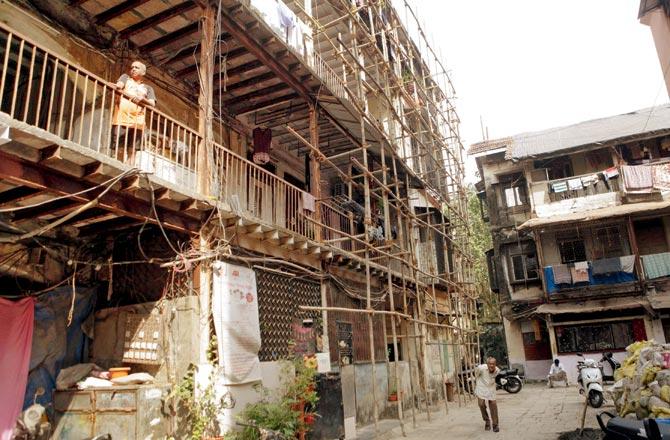
Shankar Bari Lane popularly called Papad Galli in Girgaum
This has been Kesariya's preoccupation for 32 years, more so after her husband passed away, and she had to find a way to provide for her children. "My in-laws weren't in favour of my working, so I started by making 100 rotis a day. That brought me R12," she remembers. Her tiffins today go out to 15 clients at R120 each. "The delivery boys take R40 as share. Apda par dukh ave to karvu pade [when hard times falls upon us, we have to stand up to it]," says Kesariya, who hails from Gunagadh. While her daughters are now married, she continues to live here with her son and ailing brother-in-law. With the R23,000 she earns every month, her family manages to survive and save.
Her day starts at 5 am, with filling water, washing the family's clothes and bathing. She then performs a small ceremony to wake up Thakorji since she is a devotee of the Pushti Bhakti Marg. Meal orders are wrapped up by 2 pm after which she spends me-time scrolling through WhatsApp and Facebook.
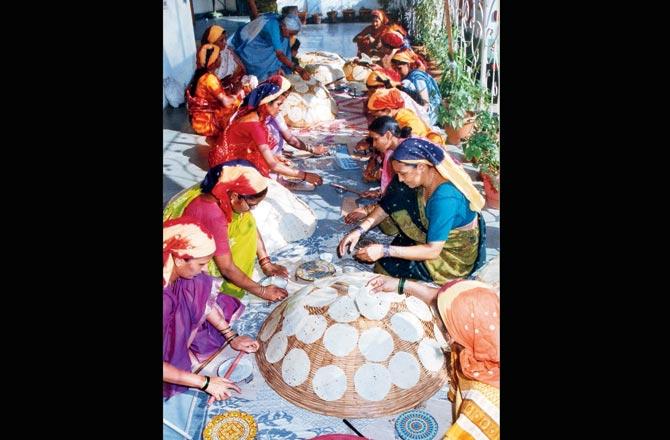
An archival images of women at work for Shri Mahila Griha Udyog Lijjat Papad
A stone's throw away is Ranjan Badiyani's home. She sits on a modest swing, chopping cabbage. A stout lady with her hair in a bun, she hobbles to the kitchen, shifting her weight from one leg to another, getting us a glass of water. Her mood seems off. "Aje karigar nathi avyo [the cook hasn't turned up]," she tells us. She shows us a dabba filled with half-fried, square Chinese jain samosas. "I sell 15-17 kilogram to stock at shops and for private orders daily," she says parroting the ingredients: cabbage, bell peppers, and a special sauce.
Behind the Shiv temple is where Ratna Lukka makes dhoklas. When we meet her husband at his office at the mouth of the lane, he says they make white and tirangi (tri-coloured) sandwich, khaman, pizza, damani, cheese and even paneer dhokla. "We have been in the business for 17 years.
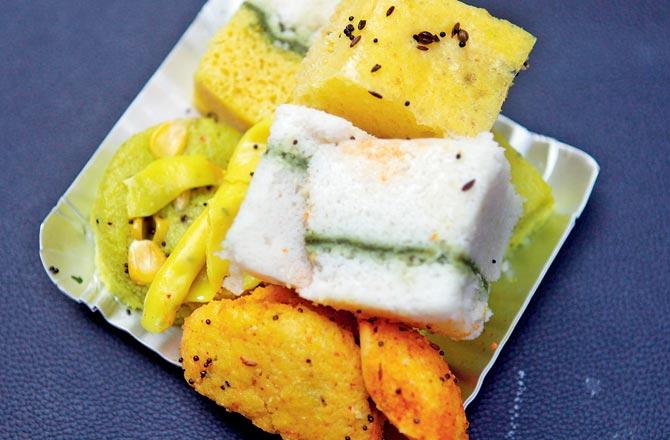
Ratna Lukka's assorted dhokla plate
It is already mid-day by the time the residents are freed up for a chat. A gentleman, who has moved into the locality four months ago, says, "To understand the labour-intensive work that goes on here, you should come in the mornings."
We heed him and return the next day, at 7 am.
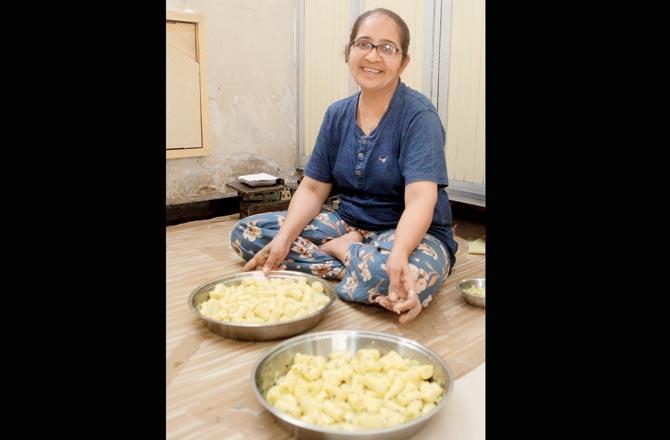
Bhavna Tushar Popat is a khandvi specialist. Also called patuli in Marathi, the khandvi is a rolled bite-sized steamed snack of gram flour and yogurt. Pics/Ashish Raje
In 15-G, room number 219, Aruna Panchmatya's kitchen is a party in full swing. A man has finished kneading the dough for about 3,000 rotis, and is stationed by the stove to pass on rotis to a female staffer who places them on the stove to fluff. A woman sitting beside her has the sole responsibility of dabbing on some ghee on each. On the floor, Aruna ben, along with a helper, makes small roundels of the dough and works the rolling pin. She keeps a count and after every 100 rotis, she makes a note in a book.
Her mind travels back when she says, "I used to make alad na papad, khichiya papad, puri, thepla and dry snacks like chevdo, chakri and even samosa. It used to be a competition to bag the maximum orders. Almost every household ran a business. For one rupee, we could lose a customer. We couldn't take a single day off. Aa area ni ronak hati tyare [those were the heydays]." Now, about 15 homes of the 300 run a food business. Some of the elders have passed on and families have moved out.
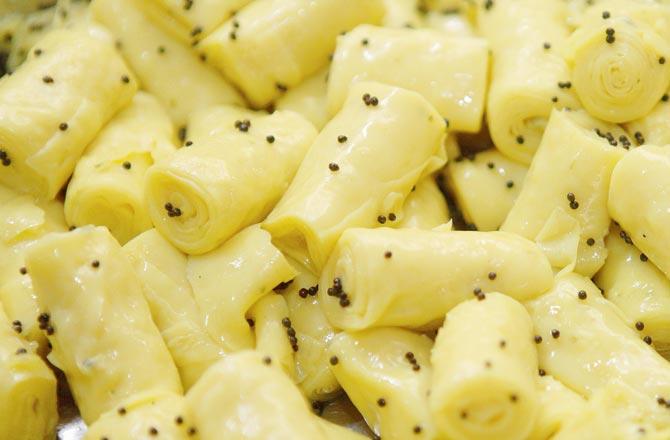
Like Kesariya, her day begins at 4 am to fill water, clean the house, and be ready to start rolling by 6 am. And she goes on till 10.30 am without a break. "After that, my day is free. I am too tired to do anything else. The evenings are reserved for next day's prep."
Bhavna Tushar Popat is a khandvi specialist. Her supple fingers move in a skilled manner as she takes a knife and chops the line of steamed besan dumplings into equal pieces. "My mother-in-law, Jayaben, and my husband started this business 30 years ago. I used to work in the administration department of a bio-medical engineering set up. Once fax and paper work was computerised, I had to leave," says Popat, who readily offers us her recipe. She follows a one is to three proportion of besan flour and chaas or buttermilk.
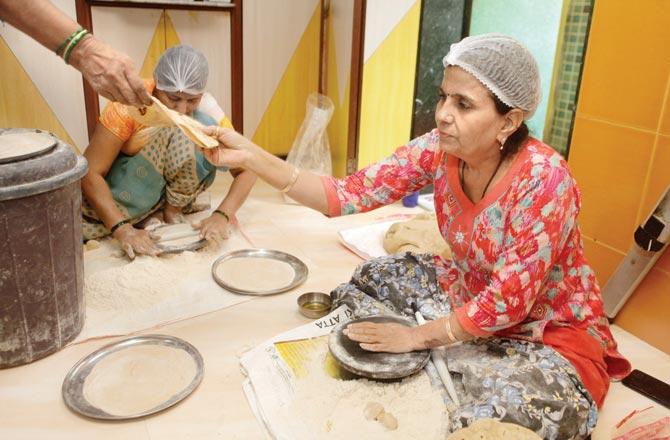
Aruna Panchmatya's team of two makes 3,000 chapatis a day
"Turmeric, salt and coriander, peas and coconut mix for stuffed khandvis. They turn out like pista rolls. We also make a farali [fasting] version with singoda atta [water chestnut flour]," she smiles, throwing a look at her husband, Tushar. This family hails from near Veraval in Saurashtra.
In the kitchen, Popat points to a big pan. "By mistake, we added double water in the batter. Errors are human. We have to restart from scratch." Tushar says the chawl holds stories of courage and independence displayed by women who took on the responsibility of earning a living when the men couldn't provide. "When my father met loss in his business, my mother started making rotis and thepla. I used to go out and do the deliveries," he recalls. Today, Popat's son helps out in the kitchen before heading to college. Popat takes the tray to the kitchen, adds rai no vaghar (mustard tadka), gently giving the steel platter a shake to mix it evenly.
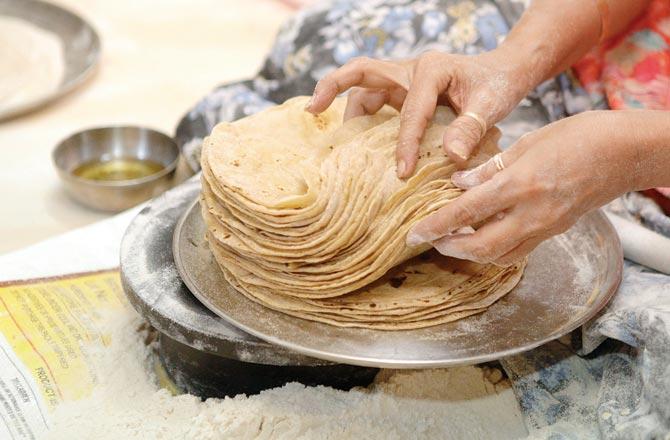
At 8 am, notes of the manjira and conch shell drift out of Annapurna Tiffin Room in Room Number 4 of 15C of Lohana Niwas. Workers are huddled inside the kitchen to knead the dough, make roundels, pass them to the person rolling the rotis and to the kitchen platform for roasting. A staffer says, "This is the Kalkaji aarti that we listen to in Rajasthan. We cannot begin without her [goddess's blessings]."
Outside, a team of three is filling up steel tiffins with measured rice, sabzi, roti and salad portions. Chaitali Balsara started the service four years ago
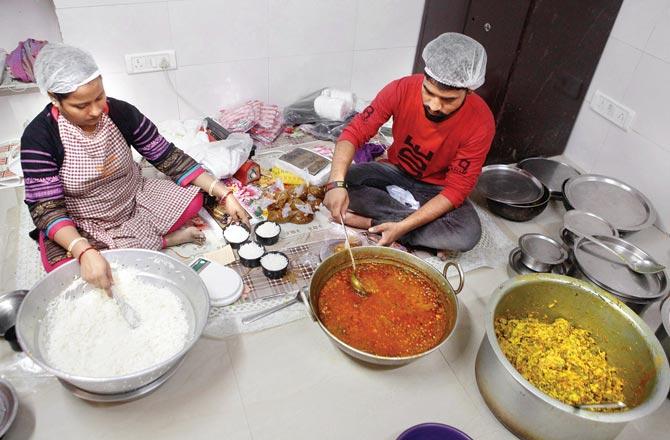
She started the tiffin service at her husband Ashish's behest. An electrical contractor, his job took him all over Mumbai. "I was always struggling to find a nutritious meal while on the job. I asked Chaitali to start a tiffin service, but she was busy with raising our daughter. I promised her that once she had five tiffin clients, I would set up a team for her. She would only have to oversee," he says. This was 2015. Today, they cater to a dargah close by, take party orders and feed 200 clients daily. "When we started, my husband used to make the deliveries himself. In 2016, we tied up with the dabbawalas. Every morning when I walk into this area, I feel inspired. Everyone is working hard, everyone seems dedicated. On days, when any of us falters, or lags behind, we know there will be neighbours who will chip in to help."
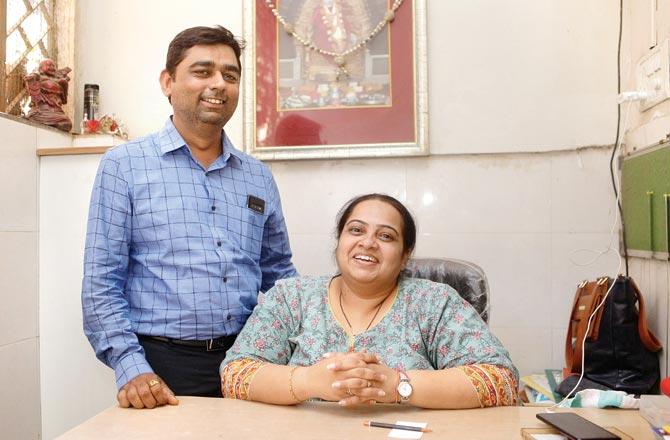
Chaitali Balsara and husband Ashish of Annapurna Tiffin Room cater to 200 clients dail
Catch up on all the latest Mumbai news, crime news, current affairs, and also a complete guide on Mumbai from food to things to do and events across the city here. Also download the new mid-day Android and iOS apps to get latest updates
 Subscribe today by clicking the link and stay updated with the latest news!" Click here!
Subscribe today by clicking the link and stay updated with the latest news!" Click here!







